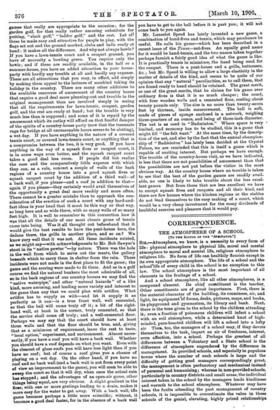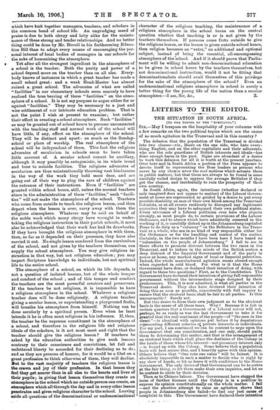CORRESPONDENCE.
THE ATMOSPHERE OF A SCHOOL.
[To TRIM EDITOR OY THE "SPROTATOR..] SIE,—Atmosphere, we know, is a necessity to every form of life : physical atmosphere to physical life, moral and mental atmosphere to moral and mental life, religious atmosphere to religious life. No form of life can healthily flourish except in its own appropriate atmosphere. The life of a school and the schoorlife of every child in the school is no exception to this law. The school atmosphere is the most important of all elements in the fruitage of a school.
And a school atmosphere, like all other atmospheres, is a compound element. Its chief constituent is the teacher, Other constituents are of great importance. First, there is the material character of the building, its roominess, air, and light, its equipment 'of forms, desks, pictures, maps, and books, its playground and gymnasium, its library and bank. Next, there is the tone given to the school by the children attending it; even a fraction of poisonous children will infect a school with an evil atmosphere, while a determined knot of high- minded, pure-hearted children will lift a school into a lofty air Them, too, the managers of a school may, if they devote themselves to the tasks impart an air of freshness, interest, even affection, into a school. Perhaps the greatest of all differences between a Voluntary and a State school is the difference of atmosphere engendered by the difference in manage'ment. In provided schools, and especially in populous towns where the number of such schools is large and the difficulty of getting good managers correspondingly great, the management is often perfunctory and mechanical instead of personal and humanising; whereas in non-provided schools, particularly in country districts and small areas, the individual interest taken in the school by the managers lends kindliness and warmth to the school atmosphere. Whatever may have been the faults attending the past management of country schools, it is impossible to overestimate the value in those schools of the genial, elevating, highly prized relationships
which have knit together managers, teachers, and scholars in the common bond of school life. An ungrudging meed of praise is due to both clergy and laity alike for the mainte- nance of these strong and tender relationships. And no better thing could be done by Mr. Birrell in his forthcoming Educa- tion Bill than to adopt every means of encouraging the per- sonal interest of local bodies of managers in our schools for the sake of humanising the atmosphere.
Yet after all the strongest ingredient in the atmosphere of a school is the teacher. Both the purity and power of a school depend more on the teacher than on all else. Every- body knows of instances in which a great teacher has made a small school great: and a weak Head-Master has almost ruined a great school. The advocates of what are called " facilities " in our elementary fichools seem scarcely to have realised the true bearing of these " facilities " on the atmo- sphere of a school. It is not my purpose to argue either for or against "facilities." They may be necessary to a just and wise settlement of our intricate education problem. That is not the point I wish at present to examine; but rather their effect in creating a school atmosphere. Such "facilities" as may be granted out of school hours to persons unconnected with the teaching staff and normal work of the school will have little, if any, effect on the atmosphere of the school. They will be distinct and apart: as much as the Sunday- school or place of worship. The real atmosphere of the school will be independent of them. This fact the religious advocates of secularism in schools seem to have taken little account of. A secular school cannot be ancillary, although it may possibly be antagonistic, in its whole trend and tone to outside facilities. The religious advocates of secularism are thus unintentionally throwing vast hindrances in the way of the work they hold most dear, and are going out of their way to plug the ears of children against the entrance of their instructions. Even if "facilities" are granted within school hours, still, unless the normal teachers share in the administration of these "facilities," such " facili- ties " will not make the atmosphere of the school. Teachers who come from outside to teach the religious lesson, and then depart when the lesson is over, carry away with them the religious atmosphere. Whatever may be said on behalf of the noble work which many clergy have wrought in under- taking the religious instruction in their parish schools, it must also be acknowledged that their work' has had its drawbacks. If they have brought the religious atmosphere in with them, then, so far as it depended on their presence, they have also carried it out. No single lesson sundered from the curriculum of the school, and not given by the teachers themselves, can supply the school atmosphere. You may give religious in- Struction in that way, but not religious education ; you may impart Scripture knowledge to individuals, but not spiritual life to the entire school.
The atmosphere of a school, on which its life depends, is not a question of isolated lessons, but of the whole temper and conduct of the school ; and of this temper and conduct the teachers are the most powerful creators and preservers. If the teachers be not religious, it is impossible to have a religious atmosphere in the school. Whatever a religious teacher does will be done religiously. A religious teacher giving a secular lesson, or superintending a playground frolic, will breathe his atmosphere from himself. Nothing can be done secularly by a spiritual person. Even when he least intends it he is often most religious in his influence. If, then, the teacher be the supreme constituent in the atmosphere of a school, and therefore in the religious life and religious ideals of the scholars, is it not most meet and right that the teacher should give the religious lesson ? If teachers be asked by the education authorities to give such lessons contrary to their conscience and convictions, let full and unfettered liberty be accorded for their declining so to do ; and as they are persons of honour, for it would be a libel on a great profession to think otherwise of them, they will decline. 31 at to the vast majority of teachers the religious lesson is the crown and joy of their profession. In that lesson they feel they get nearer than in all else to the hearts and lives of their pupils ; in giving that lesson themselves they create an atmosphere in the school which no outside person can create, an atmosphere which all through the day and in every other lesson penetrates and gives religious character to the school. Leaving aside all questions of the denominational or undenominational character of the religious teaching, the maintenance of a religious atmosphere in the school turns on the central question whether that teaching is or is not given by the teachers themselves. If persons come froln outside to give the religious lesson, or the lesson is given outside school hours, then religion becomes an "extra," an additional and optional subject, instead of being the essential, all-enoompassing atmosphere of the school. And if it should prove that Parlia- ment will be willing to admit non-denominational education to be given in school hours by the teachers themselves, but not denominational instruction, would it not be fitting that denominationalists should avail themselves of this privilege for the sake of the atmosphere of the school ? Even an undenominational religious atmosphere in school is surely a better thing for the young life of the nation than a secular











































 Previous page
Previous page